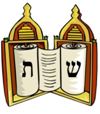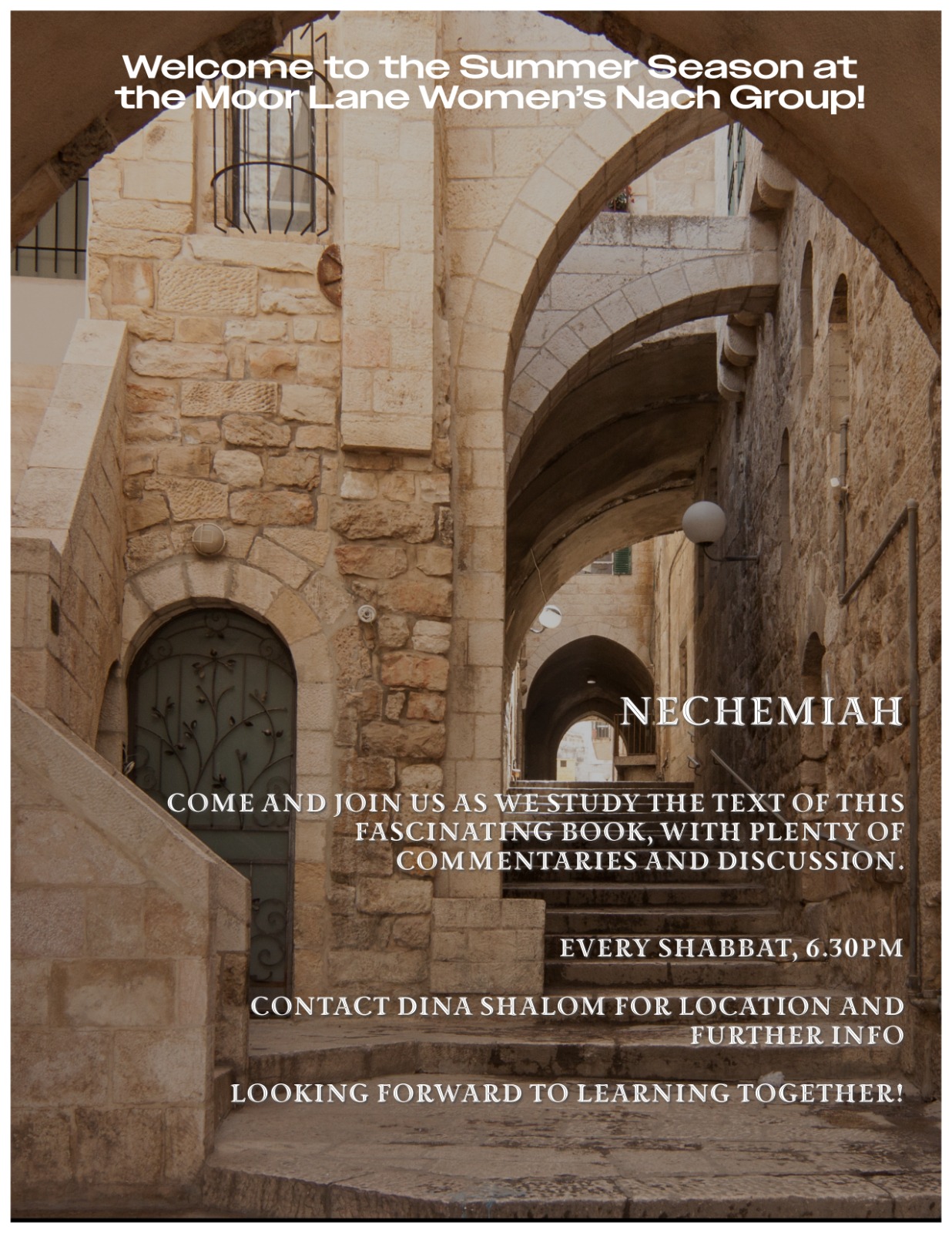
ק׳ ק׳ שׁערי תפילה

*****
Shiva Asar BeTammuz

Taanit – Fast
Motzae Shabbat
🗓️ Sunday 13th July
Fast begins 1:15 am
🌄 Shacharit 8:00 am
📖 Mincha 9:00 pm
🌇 Shekia 9:31 pm
🌃 End of the fast 10:33 pm
*****

לוח זמני תפלה לקיץ תשפ״ה
Summer Timetable 5785 – 2025
מוצאי שבת | ערבית )מוצ”ש( | שקיעה | סוף זמן קראת שמע | זמן שבת | פלג מנחה (תה״ד) | פלג מנחה (לבוש) | מנחה וקבלת שבת | תאריך | שבת פרשת |
Shabbat Ends | Arbit | Sunset | Shema to be read before | Candles to be |
| Earliest Candle lighting | Minha & Kabbalat Shabbat* | Date | Parasha |
PM | PM | PM | AM | PM | PM | PM | PM |
|
|
10:45 | 10:41 | 9:32 | 9:04 | 9:19 | 8:32 | 7:51 | 7:30 | 11/12 July | בלק |
🕯️SUMMER TIMES FOR SHABBAT 🕯️
שבת
קרבנות
9:00 am
הודו
9:15 am

מנחה
6:30 pm
****

****
Balak, King of Moav, is in morbid fear of the Bnei Yisrael. He summons a renowned sorcerer named Bilaam to curse them. First, G-d speaks to Bilaam and forbids him to go. But, because Bilaam is so insistent, G-d appears to him a second time and permits him to go. While en route, a malach (emissary from G-d) blocks Bilaam's donkey's path. Unable to contain his frustration, Bilaam strikes the donkey each time it stops or tries to detour. Miraculously, the donkey speaks, asking Bilaam why he is hitting her. The malach instructs Bilaam regarding what he is permitted to say and what he is forbidden to say about the Jewish People. When Bilaam arrives, King Balak makes elaborate preparations, hoping that Bilaam will succeed in the curse. Three times Bilaam attempts to curse, and three times blessings are issued instead. Balak, seeing that Bilaam has failed, sends him home in disgrace. The Bnei Yisrael begin sinning with the Moabite women and worshipping the Moabite idols, and they are punished with a plague. One of the Jewish leaders brazenly brings a Midianite princess into his tent, in full view of Moshe and the people. Pinchas, a grandson of Aharon, grabs a spear and kills both evildoers. This act brings an end to the plague — but not before 24,000 people died.
Ohr Somayach Institutions www.ohr.edu

שבעה עשר בתמוז
תענית
שבעה עשר בתמוז
נאמר
בספר זכריה (פרק ח פסוק יט) “כה אמר ה' צבאות, צום הרביעי וצום החמישי וצום
השביעי וצום העשירי יהיה לבית יהודה לששון ולשמחה ולמועדים טובים, והאמת והשלום אהבו”.
ופירשו חז”ל (במסכת ראש השנה דף יח:), צום הרביעי זה צום שבעה עשר בתמוז, כי
חודש תמוז הוא החודש הרביעי מחודש ניסן. (וידוע שחודש ניסן הוא הראשון לחודשי השנה
לפי מנין תורתינו הקדושה). וצום החמישי זה צום תשעה באב, כי חודש אב הוא החודש
החמישי מחודש ניסן. וצום השביעי זה צום גדליה, שהוא בשלושה בתשרי, שהוא החודש
השביעי מחודש ניסן. וצום העשירי זה עשרה בטבת, שהוא החודש העשירי מחודש ניסן.
דין
התענית
כתב
רבינו הרמב”ם, שכל ישראל מתענים בימים אלו, מפני הצרות שאירעו בהם, כדי לעורר
הלבבות ולפתוח דרכי התשובה, ויהיה זה זכרון למעשינו הרעים, ומעשה אבותינו שהיה
כמעשינו עתה, עד שגרם להם ולנו אותן הצרות, שבזכרון דברים אלו נשוב להיטיב, שנאמר
והתודו את עונם ואת עון אבותם.
מה
אירע ביום שבעה עשר בתמוז?
ביום
שבעה עשר בתמוז אירעו חמישה דברים קשים, ואלו הן: נשתברו לוחות הברית, הופסקה הקרבת קרבן התמיד
בכל יום בבית המקדש, הבקיעו האויבים את חומת ירושלים בתקופת חורבן בית המקדש השני,
שרף אפוסטמוס הרשע את התורה, והועמד צלם בהיכל בית המקדש.
זמן
התענית
הכל
חייבים להתענות ביום שבעה עשר בתמוז, וחיוב התענית הוא מעלות השחר ועד לצאת
הכוכבים. ואף על פי שזמן התענית הוא מעלות השחר, מכל מקום מי שקם משנתו באמצע
הלילה קודם עלות השחר, אסור לו לאכול, אלא אם כן התנה קודם שהלך לישון שבכוונתו
לקום ולאכול.
מי הוא
המחוייב בתענית זו?
קטנים, דהיינו בן פחות משלוש
עשרה שנים, ובת פחותה משתים עשרה שנים, פטורים לגמרי מתעניות אלו. ואינם צריכים
להתענות אפילו כמה שעות. ואפילו אם יש בהם דעת להתאבל על חורבן ירושלים, כל שלא
הגיעו לגיל מצוות, פטורים לגמרי מתעניות אלו, ואפילו אם רוצים להחמיר על עצמם ולהתענות,
יש למחות בידם. ויש מחמירים שלא לתת לקטנים בתענית ציבור אלא לחם ומים. וכן מנהג
כמה מעדות האשכנזים שילדים קטנים שכבר מבינים ענין החורבן, אינם אוכלים אלא לחם
ומים. אבל הספרדים ובני עדות המזרח לא נהגו כן, וכן העיד מרן הרב חיד”א,
שמנהג הספרדים שנותנים לילדים כל צרכם ביום תענית ציבור.
ומעוברות
ומניקות פטורות מלהתענות בשבעה עשר בתמוז, בצום גדליה ובעשרה בטבת. (ולענין תשעה
באב יבואר אי”ה בזמנו). ואפילו אם רוצות להחמיר על עצמן ולהתענות יש למחות
בידן.
ולענין
זה נקראת מעוברת כל שהוכר עוברה, דהיינו שעברו שלושה חודשים מתחילת הריונה. ואם
סובלת ממחושים והקאות פטורה מכל התעניות הללו גם קודם עבור שלושה חודשים מתחילת
הריונה, ובפרט אם עברו כבר ארבעים יום מתחילת הריונה.
ולגבי
מינקת, כלומר, אשה מניקה, שאמרו שפטורה מתעניות אלו. נחלקו הפוסקים, אם רק אשה
שהיא מניקה בפועל פטורה מן התענית, אבל אשה שאינה מניקה בפועל, אף על פי שהיא בתוך
עשרים וארבעה חודשים מזמן לידתה, חייבת להתענות, או שלעולם אין להתחשב בכך שהיא
אינה מניקה בפועל, שכל עשרים וארבעה חודשים מזמן הלידה האשה חלשה מאד, וכמו שאמרו
רבותינו “שאבריה מתפרקין”, ולכן יש לפטרה מן התענית. ומרן הרב
שליט”א, היה מורה ובא במשך שנים להקל בדבר, ושכל אשה תוך עשרים וארבעה חודשים
ללידתה, פטורה מלהתענות בתעניות אלה. וכן כתב בספרו חזון עובדיה העוסק בהלכות
הללו, שכל אשה מינקת פטורה מן התענית, ואפילו אם אינה מניקה בפועל, כל שהיא תוך
עשרים וארבעה חדוש מלידתה, יש לפטרה מן התענית. אולם הוסיף, לאחר שעיין בדבר,
שנכון להקל בזה דוקא באופן שהיא מרגישה בעצמה חולשה יתרה, שאז דינה כדין מינקת, אבל
אם היא אינה חשה תחושה של חולשה יתירה, כגון סחרחורת וכדומה, נכון להחמיר שתתענה
אף היא. וכן פסקו עוד מרבני זמנינו, ובהם הגאון רבי שלום משאש זצ”ל ועוד. ויש
אומרים שכל אשה שהיא תוך עשרים וארבעה חודשים ללידתה, הרי היא פטורה מן התענית,
משום שבדרך כלל היא עסוקה בשאר עניני הבית, ונחלשת מאד מחמת התענית
The Seventeenth of Tammuz
The Fast of the Seventeenth of Tammuz
The prophet Zecharia (8, 19) states: “So says Hashem, G-d of Hosts: The fourth,
fifth, seventh, and tenth fast days shall be for the house of Yehuda for
gladness, joy, and good times; [only] love of truth and peace.” Our Sages (in
Masechet Rosh Hashanah 18b) explain that the “fourth fast day” refers to the
Seventeenth of Tammuz, for Tammuz is the fourth month when counting from Nissan
(Nissan is the first of the months of the year according to our holy Torah).
The “fifth fast day” refers to the fast of the Ninth of Av, for Av is the fifth
month when counting from Nissan. The “seventh fast day” refers to the Fast of
Gedalya which falls out on the third of Tishrei, which is the seventh month
from Nissan. The “tenth fast day” refers to the fast of the Tenth of Tevet,
which is the tenth month from Nissan.
The Essence of the Fast
The Rambam writes that the entire Jewish nation must fast on these days because
of the tragedies that befell them on these days. This will serve to awaken
their hearts and open the pathways to repentance. This will also serve as a
reminder of our evil deeds and the deeds of our ancestors that resembled our
current deeds which eventually caused these tragedies to befall them and us.
Upon remembering these things, we shall mend our ways, as the verse states,
“And they shall confess their sins and the sins of their fathers.”
What Occurred on the Seventeenth of Tammuz?
The following five terrible events occurred on the Seventeenth of Tammuz: The
two tablets bearing the Ten Commandments were broken, the daily Tamid offering
brought in the Bet Hamikdash ceased, our enemies breached the walls of
Jerusalem in the Second Temple era, the wicked Apostemos burnt the Torah, and
an idol was erected in the sanctuary of the Bet Hamikdash.
The Time of the Fast
Everyone is obligated to fast on the Seventeenth of Tammuz, and the fast begins
at dawn and ends at nightfall with the emergence of the stars. Although the
fast begins at dawn, if one wakes up in the middle of the night before dawn,
one may not eat unless one specifically makes a condition before going to sleep
that one has in mind to wake up and eat before the fast begins.
Who Is Obligated to Fast?
Minors, meaning boys under the age of thirteen and girls under the age of
twelve, are completely exempt from these fasts. They need not even fast for
several hours. Even if they have the understanding to mourn over the loss of
the Bet Hamikdash, as long as they have reached Bar/Bat Mitzvah age, they are
completely exempt from these fasts. Even if they wish to act stringently and
fast, one should object to them doing so. Some are stringent to only feed
minors bread and water on public fast days. This is indeed customary among some
Ashkenazi communities who hold that if the child is able to understand the
gravity of the destruction of the Bet Hamikdash, he should only be fed bread
and water. However, Sephardic and Middle Eastern Jews customarily do not rule
this way, as Maran Ha’Chida testifies that the custom among the Sephardim was
to feed their children whatever they needed on public fast days.
Pregnant and nursing women are exempt from fasting on the Seventeenth of
Tammuz, the Fast of Gedalya, and the Tenth of Tevet. (Their law regarding Tisha
Be’av will, G-d willing, be discussed at a later time.) Even if they wish to be
stringent and fast, one should object to them doing so.
Regarding this matter, a pregnant woman is defined as when her pregnancy is
noticeable, meaning when the first trimester of pregnancy has elapsed. However,
if she suffers from aches, pains, vomiting, and the like, she is exempt from
all of these fasts even before three months of pregnancy have elapsed; this is
especially true if forty days from the start of her pregnancy have already
elapsed.